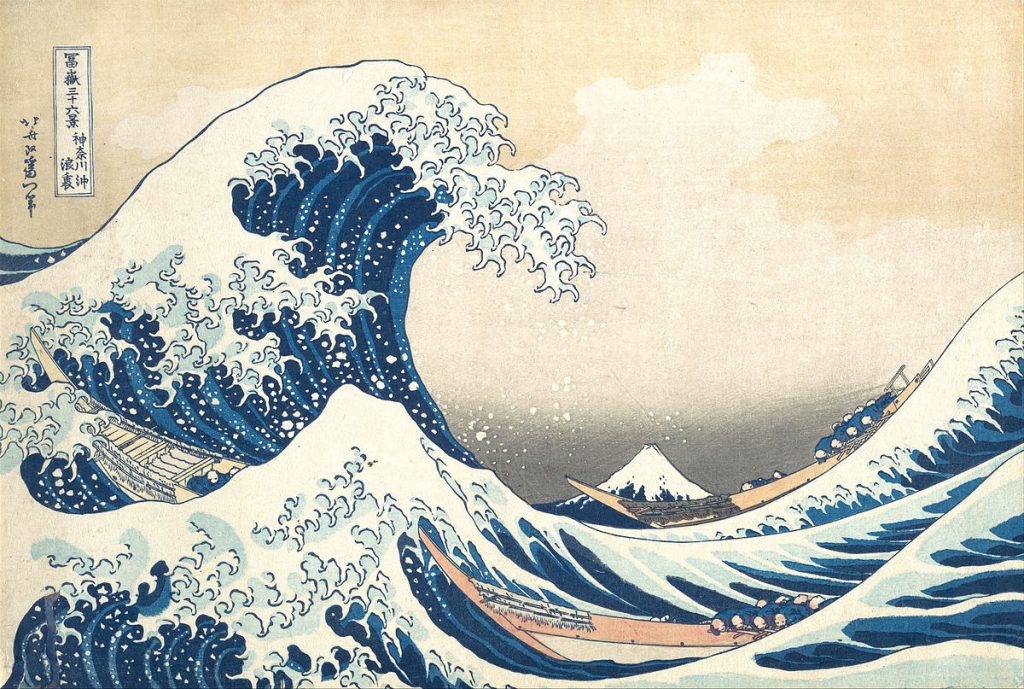What do you suppose would happen if Buddhism were to be brought to China, and then introduced to the samurai warriors of Japan? If you answered that Zen Buddhism would be created, then you’re correct. The Chinese, especially the Taoists, were intrigued by Buddhism’s profound philosophy, dialects, analyses, and speculations. However, Buddhism’s advocacy of a homeless life, world-fleeing, and life-denying tendencies did not mesh with the Chinese people’s worldly and practical centered lives.

Keeping with Buddhism’s made idea of achieving Nirvana, Zen focuses on achieving Satori (さとり) (enlightenment). Instead of focusing on escaping the cycle of rebirth, Zen focuses on finding meaning in everyday activities such as eating, working, and business etc. The meaning revealed to us is in being itself, or isness, often referred to in Japanese as kono-mama (この-まま) or sono-mama (この-まま). Another characteristic of Zen is that is does not deal with the abstract. A Zen-man will have no need for instruments of other media to express his art. Instead, upon achieving Satori (さとり), a Zen-man will become privy to a world of wonders and miracles 1, and his art will be expressed through the transformation of his life into a world of creation.2 Ultimately, a person will not escape the cycle of rebirth. Rather, they continue to be reborn so that they may help others achieve Satori (さとり) through Zen. The Chinese developed Zen as a form of Buddhism that focused more heavily on the physical and living world rather than a different one.
This explains how Zen came about but, how did it make its way to Japan? Japan and China had a big brother little brother relationship. China was the larger and more powerful country with a plethora of resources at its disposal, whereas Japan was an island nation that had limited resources available to itself. Because of this, Japan frequently traded goods and ideas with China. Through continuous trade, Japan would adopt many of China’s farming practices, its calendar system, and their written language, also known as Kanji. Even the Japanese government would import laws and other ideas from the Chinese government, even going so far as to send students and government officials to study from Chinese officials. Over time, Japan’s culture would become very similar to China’s own, by becoming much more focused on the living world rather than the afterlife. It was through this trade relationship that the twelfth-century Buddhist priest Eisai journeyed to China. Upon his return, Eisai brought with him Buddhism’s newest school of thought to Japan and began introducing Zen to the Kyoto area.3

However, Zen was not the first form of Buddhism introduced to Japan. While there is some debate over the exact time when Buddhism was first introduced to Japan, the most commonly agreed upon time frame is 500 to 550 C.E. Because the older schools of Buddhism were already well established in the Kyoto region, Zen struggled to gain popularity. Eisai was forced to take a conciliatory stance in relation to the older schools of Buddhism, and diplomatically garnered favor with the Imperial Court. After his peaceful attempts to spread Zen were met with violence, Eisai traveled back to the Kamakura region, home of the Hojo government (1200-1330). It was here in the Hojo government that Eisai was able to spread Zen to a wider audience.4
The Hojo Government was known for being a militaristic regime.5 The most well-known member of the Hojo family was Hojo Tokimune. Tokimune is widely considered one of Japan’s greatest historical figures for his successful quelling of the Mongol invasions. Tokimune was only thirty-two at the time of his death, but in his short life, Tokimune dedicated himself to the study of Zen and erected temples for the Chinese Zen masters in Japan. Due to his revered status and position in the Hojo regime, many of the lower ranking generals and samurai adopted Zen both as a way to honor their fallen leader and because living a Zen life was thought to be the way a samurai should live his life.

Zen has its strongest connection to the samurai through the famous Bushido Code, also known as the way of the warrior, which is the code samurai live their lives by. A samurai that follows the Bushido Code values loyalty, filial piety, and kindness above all else. However, to live this life, a samurai must clear his mind of all other distractions, including the fear of death. To be an infallible guardian that their masters expected them to be, a samurai had to only concern himself with living, or isness, and in doing so would find Zen and achieve Satori (さとり). For a samurai, living by the Bushido Code and being their master’s almighty guardian was best achieved through living a Zen life and achieving Satori (さとり). Funny how it was the blending of an Indian religion with Chinese ideas that helped the Japanese samurai live a life more in line with their warrior code.
- Ichirou Ishida and Delmer Brown, “Zen Buddhism and Muromachi Art, The Journal of Asian Studies, Vol. 22, No. 4 (Aug., 1963): 419 ↵
- Wm. Theodore de Bary, Donald Keene, George Tanabe, and Paul Varley, Sources of Japanese Tradition 2nd ed., vol. 1 (New York: Columbia University Press, 2001), 321-324. ↵
- Encyclopedia of Religion, 2005, s.v, “Buddhism: Buddhism In Japan,” by Brian O. Ruppert ↵
- E. Dale Saunders, Buddhism in Japan With an Outline of Its Origins in India (Great Britain, India, Pakistan: Oxford University Press London, Bombay, and Karachi, 1964), 94. ↵
- Daisetz T. Suzuki, Zen and Japanese Culture (New York: Pantheon Books Inc., 1960), 62. ↵



39 comments
David Castaneda Picon
I have never heard about the Zen Buddhism culture before, I think it is very interesting and an amazing culture, the thing I like the most about them is that they focus more on living the moment, as the author Robert Rees said in this article, “[they focus] more on the physical and living world rather than a different one”, which is something that I think most people don’t do, including myself, I’m always thinking on what is going to happen next or I overthink what just happened in the past so much that I don’t focus myself on living in the present and enjoy the moment.
Todd Brauckmiller Jr.
Very interesting to see a spread of different religions to different countries. Seems many travelers and merchants end up learning something new and then bringing it back to their homelands. For me I grew up in a religious household (both Christian and Catholic) and I do seem quite interested in these other religions. Learning new religions really expands the mind into not only understanding others but to also understand where they came from.
Emmanuel Ewuzie
Zen Buddhism’s influence on the samurai of Japan is a testament to religion’s ability to control people as Zen Buddhism gave a code for the samurai to live and abide by. Religion’s extension of influence doesn’t end there as religion often gave justification to individuals and groups to perform certain acts. For example, Christianity gave justification for the Crusades as its purpose was to reclaim the holy land.
Andres Cano
I think it is intriguing to know about all the different influences and roles that Buddhism played on the development of the Eastern World. In U.S. History courses we miss out on a lot that goes on across the other side of the world, and Buddhism is certainly more than just a world religion. I have heard of many of the interpretations such as: Religion, Philosophy, Way of Life, Discipline, etc. I believe that the extent of Buddhism extends to all of these branches of belief and it is no wonder that this form of Zen Buddhism was able to make its way to China’s Little Brother, Japan.
Diego Terrazas
A samurai’s warrior code is one that values honor, loyalty and discipline above all else. I could see the Buddhist and Zen influences in this way of life. the people who stay behind to help others reach nirvana reminds me of Bodhisattva. Ultimately, I think one of the most admirable aspects of samurais is how they accepted death almost without a care or regret.
Michael Hinojosa
This article was not only interesting but extremely informative as well! I’ve always been interested in Japanese and Chinese culture and really wanted to know what the differences were between the two countries in terms of culture. My interest for this article also stemmed from the fact I actually got to go to Japan; so thank you for writing this article and letting me take a relative stroll down memory lane!
Daniela Cardona
I thought this article was really cool. Buddhism and Chinese culture have always interested me. I really liked how the author threw in Chinese words and letters as well. It gave me an insight in to Chinese culture and ways of life I had not before found. It was an easy read which really helped.
Jabnel Ibarra
The nation of Japan is interesting in that its relationship with China is very similar to the United States’ relationship with England. Though Japan experienced no revolutionary war for independence, much of its culture, philosophies and ideals were borrowed or influenced from China, which in turn was influenced by a variety of cultures and philosophies from around the continent. Though every culture might seem completely different at first glance, a closer inspection often reveals a surprising amount of similarities that ties these cultures together like a web. Its amazing to consider just how much our own cultures might borrow from others.
Robert Freise
This explanation of how Buddhism came to be and how it became one of the most influencial religions in human society is really interesting. This article also explains how Buddhism is a faith based on lifestyle and how things are handled throughout ones life. This article gave me really good information on why people have faith in Buddhism and how Buddhism can have an positive effect on your life. Great article!!
Sebastian Carnero
I had no idea how complex was the samurai bushido. I didn’t know that it was influenced by Chinese and Indian culture. I didn’t know Buddhism had that much influence on Japanese culture. It is interesting how the bushido could introduce ideas of another philosophy, accept it and strengthen the ideals. It surprised me how much importance they gave to an outside belief in a militaristic regime, up to the point of introducing temples.